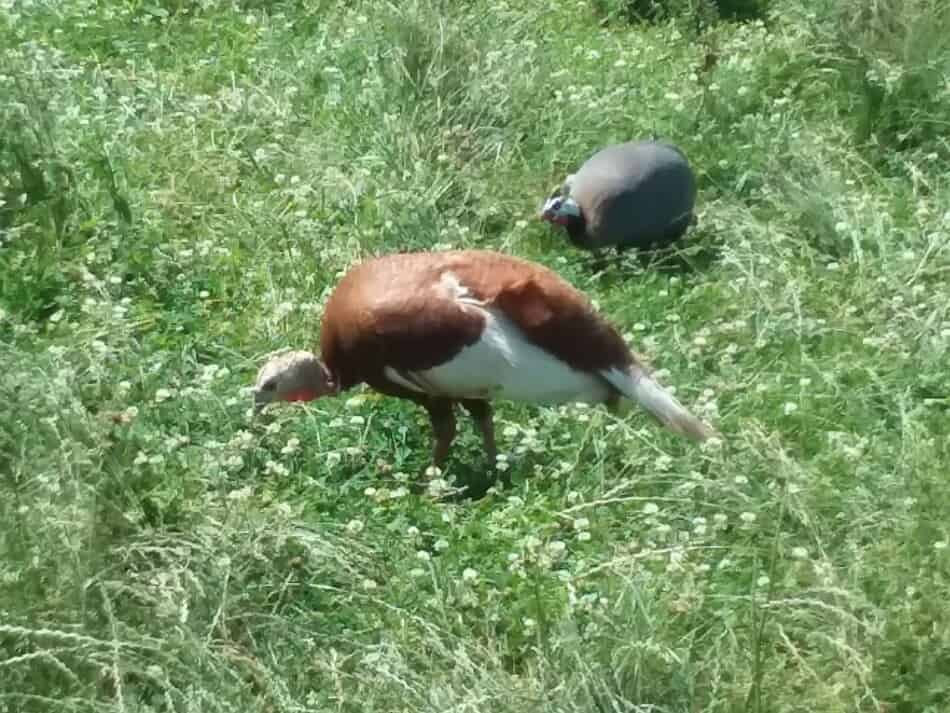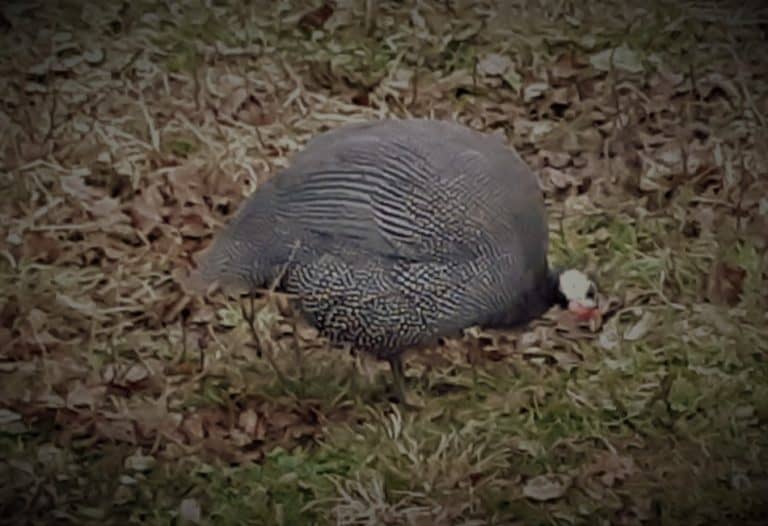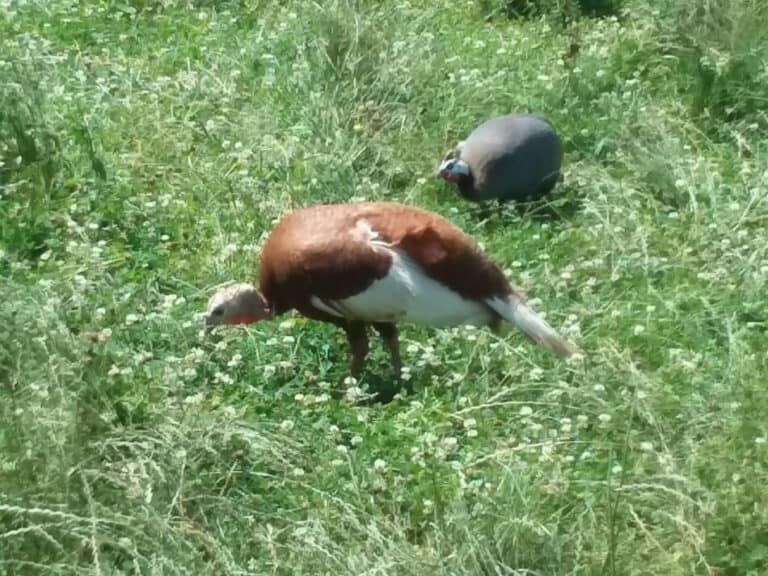Is Raising Guineas Worth It?

Guinea fowl are interesting, no doubt about that! And I’m sure you’ve heard about their tick eating ability. Other than that, what can you do with them and are guinea fowl worth raising?
Guinea fowl are worth raising if you want an easy care bird that will roam and debug, as long as you accept that they are loud, tend to wander and will need to have the keets (babies) raised in a brooder. If you need birds that are quiet, will not roam or gain well per pound of feed, guineas are not the bird you should raise.
| Cost to buy guinea keet | $5.59-6.17 each |
| Cost to feed guinea to processing size | $4.94-9.88 |
| Feed to gain ratio of guineas | 3.7 to 1 (3.7 pounds of feed per 1 pound of weight gain) |
| Highlight of raising guineas | interesting bird, easy care once fully grown, eats ticks |
| Challenges of raising guineas | noisy, tend to wander off, poor moms |
Cost To Purchase And Raise Guinea Fowl will help you figure out what you need to raise guinea keets (guinea babies).
Guinea fowl are worth raising if you value their abilities
Guinea fowl are interesting and very easy care, as adults. If you are interested in a bird that will mostly take care of itself and not need you much, guineas are a good choice.
The highlight of guineas seems to be either their meat, which is a popular pheasant like meat, wonderfully described at D’Artagnan.com or their ability to debug, specifically de-tick your yard.
The challenges of guinea fowl are that they tend to wander and they are noisy. But, if you want pheasant type taste, I feel that guineas are easier to raise than gamebirds.

Guinea fowl cost $5.59-6.17 each as keets (babies)
You can buy adult guineas to get started with guinea fowl or you can buy day old keets from a hatchery. The keets are probably a better bet, since the adults so easily wander off.
Guinea keets are $6.17 each if you buy a few and $5.59 each if you buy more than 30. This type of pricing is common, bulk orders getting a lower price per bird, so take advantage of that if it makes sense to you.
For instance, if you want 25 guineas, you might as well get 30 and get the price discount since 25 guineas will cost $154.25 and 30 guineas will cost $167.70, so those last 5 guineas are purchased for the price of 2 guineas.
Guineas are noisy
Guinea fowl seem to be a love them or hate them kind of bird. They are very interesting and unique looking, but what gets most people is the chatter, guineas are noisy.
Our guineas are everywhere, at least that’s what it seems like, and they love to chatter. Especially at night in the barn, they sit up in the rafters and chatter anytime there is another noise, including me trying to talk to my husband!
This chatter at anything new is what makes guineas get somewhat of a reputation as a watchdog. It’s not that they actually protect anything, they just make noise any time something moves, so it’s hard to sneak past them!
Guineas are not overly friendly, at least ours aren’t!
Our guineas are not friendly, I’m not saying they are unfriendly, they are just more of a watch and see while keeping my distance kind of bird.
For instance, my husband usually puts out grain for the other poultry, just shelled corn tossed on the dirt. The ducks, chickens and geese will zoom over, the guineas will watch and come for snacks when you are a safe distance away.
Guineas will stay home, if they like there
One of the things that guinea fowl are almost infamous for is wandering, especially onto the road! I’m not sure why, but they seem to be drawn to the road where, I’m sure you are not surprised to hear, they get run over.
We are fortunate enough to live far enough off of the road, our guineas do not seem to make it to the road very often, but anyone else that we have talked to about guineas is always needing another one to replace the one that got hit.
Weirdly enough, since we are on the subject of guineas staying home, we have never purchased any guineas. No joke. They wandered in from a neighbor, not sure who, and decided to stay.
Adult guinea fowl do not need a coop
The adult guineas do not need any sort of a coop, they will be fine out and about, as long as you are off of the road and have a shelter of some sort they can go into at night.
If you are on the road, close to the road or have a small yard, you’ll want them in a coop.
Ours find a spot to roost and go there in poor weather, like storms or really cold days. They’ll pop back out when they feel comfortable or get hungry.
Younger guineas will need some sort of protection from the weather until they are full size.
Adult guineas that are not used to a coop can’t be kept in a coop
You should know that adult guineas are very cage or coop wary, meaning they will pound themselves against the side of the cage or coop to get out if they have not been in one before or it was a while ago.
If your guineas were raised in a coop and have been in the coop most of their lives, this is probably not a big deal. If your guineas have been roaming about and you move them to a coop, you’ll have to watch to see how they take it.
Some guineas will be okay, others will flip out and hurt themselves in a confined area.
Adult guineas are easy, keets are not
Adult guineas are easy to keep, we really do nothing for them. That’s pretty easy!
Moms with babies are a different story, as you’ll read below. Keets are more work, they are pretty high strung and will hop out of an open topped trough or what ever you are keeping them in.
Guinea fowl are famous for debugging, ticks included
Guinea fowl are famous for eating ticks. Read my article 4 Backyard Birds That Love To Eat Ticks if you want more details.
If you want your guineas to eat ticks, they must have the ability to roam about and find the ticks themselves. If you have your guineas in a coop, this won’t do much for reducing ticks in your yard!
I must mention that while we do not have many ticks, I do find some, more in the spring or early summer, even though we have guineas running loose.
What I’m trying to point out is that guineas will not eliminate ticks, but I feel they are significantly reducing the number of ticks we (people and dogs) run into.
Guineas are a meat bird
Guinea fowl are mainly raised as a meat bird for anyone keeping them for production purposes. Guinea fowl reach processing size of 2.67 pounds in 75 days.
Since guinea fowl have a feed to gain ratio of 3.7 to 1 you can run the numbers based on your area’s feed costs and see what raising a meat guinea will cost you.
Around here this type of feed will cost anywhere from $0.50-1.00 per pound, small cute bags cost more per pound, larger 50 pound feed mill bags cost less per pound.
For me, getting a guinea from day old to processing would cost me $4.94, since it would take 9.88 pounds of feed at $0.50 per pound.
If you are getting the more expensive feed, you would be paying $9.88 in feed, since your feed is costing you $1.00 per pound.
Figuring on getting the bulk price on keets, the $5.59 each, this would cost me $10.53 in cash expenses per guinea. Of course, this does not include feeders or anything like that but it does give you an idea.
If you purchased the higher priced keets and used the higher priced feed, your cash costs would be $16.05 per guinea, which is $9.88 in feed and $6.17 per keet.
Guineas will hatch their own keets
One of the surprising things about guinea fowl, at least to me, is how great they are at hatching out a ton of babies. And from seemingly no where!
Guineas hide the nest and will all of a sudden pop out of the weeds with 10-20 keets trailing along behind them!
The other crazy part is that the guineas tend to group parent, usually two or three adults run with the keets.
Guinea hens are great setters but terrible moms
The down side of guineas hatching their own keets is that they are terrible moms!
You must keep the mom and the babies in a roomy, predator proof brooder if you want those keets to grow to adults. I’m not exaggerating, outside of a brooder those keets are toast.
You should know that the guinea hen is likely to flip out when you put her in the brooder, unless she normally lives in a contained area. We have only had minimal success keeping the mom with the keets.
Usually the hen is freaking out, hurting herself and the babies, which means we kick her out and put a heat lamp or two in the brooder for the keets and raise them inside until they are nearly full grow and can be turned outside.
If you let them run about without the protection of the brooder, there will be few if any keets that make it to full size. They get picked off by all manner of predators, including hawks and your cats.
Guineas get along with other birds
For the most part, guineas keep to themselves and really don’t bother the other birds.
Guinea fowl want to be in a group with other guinea fowl. When the group gets to a larger size, ours split off into smaller groups, but the groups are always guineas only.
Guineas do quite a bit of squabbling amongst themselves, especially during breeding season.
I have to admit, I have occasionally seen a fight between a guinea and a rooster or drake, but these instances are unusual. Normally, guineas hang out with guineas and ignore most other birds and animals.
Worth of raising guineas depends upon your outlook
So really, whether or not you get guineas depends upon what you value or what are you hoping to do with them.
If you have a small yard or close neighbors, guineas are going to be a poor choice. If noisy chatter will drive you nuts, guineas are not the bird for you.
If you have plenty of room for the guineas to roam and don’t mind the chatter, you’ll get an easy care bird that will work tirelessly to eat the bugs that you don’t want in your yard to begin with!
Around here, guinea meat is not popular, but if you are in an area where it is, you have the option of raising guineas rather than something like chickens to get a higher value bird to sell. This would work for live bird sales, too.
Additionally, a few times per year there are alternative animal and bird sales, they used to be called exotic sales, which guineas can sell well at.
The catch here is, it’s an auction, so you never know what your birds will sell for. Sometimes it’s surprisingly high, other times, not so much.

